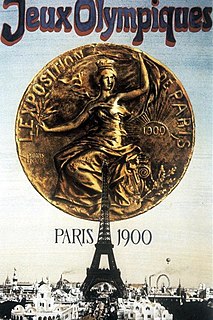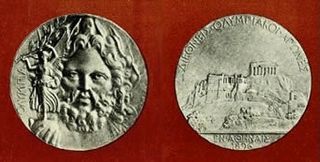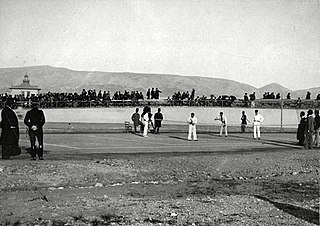
The 1896 Summer Olympics, officially known as the Games of the I Olympiad and commonly known as Athens 1896, was the first international Olympic Games held in modern history. Organised by the International Olympic Committee (IOC), which had been created by French aristocrat Pierre de Coubertin, it was held in Athens, Greece, from 6 to 15 April 1896.
At the 1896 Summer Olympics, two tennis events were contested, both for men. They began on 8 April and continued on 9 April, 10 April, and 11 April. 13 or 15 competitors from six nations, including seven Greeks, took part in the tennis competition. Many of the doubles teams were of mixed nationality, including all three medalist pairs. None of the leading players of the time such as Wimbledon champion Harold Mahony, U.S champion Robert Wrenn, William Larned or Wilfred Baddeley participated. To strengthen the field, the organization added sportsmen from other Olympic events, including weightlifter Momčilo Tapavica, hammer thrower George S. Robertson and 800-metres runners Edwin Flack and Friedrich Traun.

The 1900 Summer Olympics, today officially known as the Games of the II Olympiad and also known as Paris 1900, were an international multi-sport event that took place in Paris, France, from 14 May to 28 October 1900. No opening or closing ceremonies were held.

The 1904 Summer Olympics were held in St. Louis, Missouri, United States from July 1 to November 23, 1904, as part of the St. Louis World's Fair.
The 1900 Summer Olympics were held in Paris, France, from May 14 to October 28, 1900, as part of the 1900 World's Fair.

The 1896 Summer Olympics, officially known as the Games of the I Olympiad, were a summer multi-sport event held in Athens, the capital of Greece, from 6 to 15 April 1896, and were the first Olympic Games of the Modern era.

Australia has sent athletes to all editions of the modern Olympic Games. Australia has competed in every Summer Olympic Games, as well as every Winter Olympics except 1924–32 and 1948. In 1908 and 1912 Australia competed with New Zealand under the name Australasia.

One athlete from Victoria, a British colony which later formed part of Australia, competed at the 1896 Summer Olympics in Athens, Greece. Edwin Flack was born in England and was resident in London in 1896, but spent most of his life in Australia and so is considered an Australian athlete by the International Olympic Committee.

Germany competed at the 1896 Summer Olympics in Athens, Greece. The Germans were the third most successful nation in terms of both gold medals and total medals (13). Gymnastics was the sport in which Germany excelled. The German team had 19 athletes. The Germans had 75 entries in 26 events, taking 13 medals.

Ten athletes from the United Kingdom of Great Britain and Ireland competed in seven sports at the 1896 Summer Olympics. The Great Britain athletes were the fifth most successful in terms of overall medals (7) and tied for fifth in gold medals (2). The 7 medals came on 23 entries in 14 events.
Dimitrios written also as DemetriusKasdaglis written also as Casdagli(s), was a Greek-Egyptian tennis player. He competed in the 1896 Summer Olympics in Athens and the 1906 Intercalated Games, also in Athens.

Greece has a long presence at the Olympic Games, as they have competed at every Summer Olympic Games, one of only five countries to have done so, and most of the Winter Olympic Games. Greece has hosted the Games twice, both in Athens. As the home of the Ancient Olympic Games it was a natural choice as host nation for the revival of the modern Olympic Games in 1896, while Greece has also hosted the 2004 Summer Olympics. During the parade of nations at the opening ceremony of the Olympic Games, Greece always enters the stadium first and leads the parade to honor its status as the birthplace of the Olympics, with the notable exception of 2004 when Greece entered last as the host nation. Before the Games the Olympic Flame is lit in Olympia, the site of the Ancient Olympic Games, in a ceremony that reflects ancient Greek rituals and initiates the Olympic torch relay. The flag of Greece is always hoisted in the closing ceremony, along with the flags of the current and the next host country.

The men's foil was one of three fencing events on the Fencing at the 1896 Summer Olympics programme. It was held on the second day of competition, 7 April. Eight fencers took part, with the preliminary fencing involving a round-robin held in two groups. The first group was Pierrakos-Mavromichalis, Delaborde, Callot, and Poulos. The second was Komninos-Miliotis, Balakakis, Gravelotte, and Vouros. The two fencers that were undefeated in their groups faced each other in the final for gold and silver medals, while Pierrakos-Mavromichalis and Vouros were awarded third place. Vouros's second win came from a forfeit by Komninos-Miliotis.

Early modern Olympic Games allowed for individuals in a team to be from different nations. The International Olympic Committee (IOC) grouped their results together under the mixed team designation.

The men's doubles was one of two tennis events on the tennis at the 1896 Summer Olympics programme. The six pairs that entered were seeded into a single elimination tournament. Only five actually competed, hailing from four nations but entering as three Greek teams and a pair of mixed teams. It was the only event in the 1896 Summer Olympics that had mixed teams.

The tennis tournaments at the 2012 Summer Olympics in London were staged at the All England Club in Wimbledon, from 28 July to 5 August. This was the first Olympic grass court tournament since tennis was reintroduced as an Olympic sport and the first to be held at a Grand Slam venue in the Open era.

Early Olympic Games allowed for individuals in a team to be from different nations. The International Olympic Committee (IOC) now groups their results together under the mixed team designation. During the 1900 Summer Olympics, several teams comprising international members won 19 medals in 12 different events.













